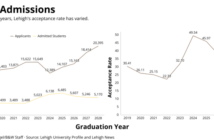The Supreme Court case Burwell v. Hobby Lobby was put up for an open discussion by three Lehigh professors on Sept. 23.
The heavily debated court case decided in June had addressed whether for-profit corporations should be exempt from a law that its owners religiously objected to.
The Hobby Lobby company, a craft store chain owned by the Green family, is considered a “closely held corporation,” meaning that it only has a few owners that own more than 50 percent of the company shares. The First Amendment of the Constitution holds a free-exercise of religion clause but does not address whether or not corporations as a whole are protected by the free-exercise of religion.
Hobby Lobby brought its case to court on the grounds that it did not want to be required by law to provide contraception to its employees because it felt doing so violated the Green family’s First Amendment rights. Female workers were provided contraception under the protection of the Affordable Care Act.
The Supreme Court ruled in favor of Hobby Lobby in its June 30 opinion, deciding that Hobby Lobby, as a closely held corporation with Christian owners, did not have to pay for contraception for its female employees, SCOTUSblog reported.
This decision could carry implications for future cases, however, opening the door for other closely held for-profit corporations to seek excuses from federal laws because of religious beliefs.
Lehigh’s discussion of the case was opened by Dena S. Davis, professor of bioethics, who noted the phrase “sincere religious belief” has been used frequently in the Hobby Lobby ruling.
Davis, who mentioned her own faith, questioned the meaning of the court’s deliberate usage of the word sincere” and wondered an “insincere” religious belief would be. The government should not be the deciding power on what is a “sincere” religious belief, she said, adding that there is no true way to evaluate the sincerity of religion in a legal situation.
“You’re not a ‘sincere’ Jew since you ate pork last week,” Davis joked, giving her comedic interpretation of what the Supreme Court’s “sincere religious belief” distinctions might look like.
Davis also argued during the discussion that corporations should not be classified as entities that can hold a religious belief. Simply because a company is run by a family or small group of people that hold a specific religious belief does not mean all company employees share that opinion, she said.
Following David was Laura Olson, a political science professor, who addressed the Supreme Court’s interpretation of the Religious Freedom Restoration Act — legislation that deals with free exercise of religion. Olson stated that the act mandated that the government shouldn’t burden someone’s expression of religion. She acknowledged that the rule stands for individuals but questioned whether it extended to companies.
Olson made the case that all the personal assets of the owners of companies are protected and are granted all legal immunity. Yet some, she said, for some reason feel that their personal religious beliefs are that which should govern the entire company.
Olson also explained how the Affordable Care Act states that if a company doesn’t mandate health insurance to their employers, they pay a tax of $2,000 per employee, which would actually be less than the health insurance company they employ.
The professor argued that families like the Greens are just not ready to let religious values get in the way of making money, which she thought was the goal of every company. Olson also cited the ruling’s effect on women and how they now cannot get the health coverage and contraception that they need.
The idea is almost discriminatory towards women, she said, arguing that a restaurant owner wouldn’t be allowed to refuse to serve to a minority because of “religious reasons.” Olson went as far as saying that the ruling basically makes “corporations people, and women simply lesser people.”
Matthew Melone, a professor in the College of Business and Economics, closed out the discussion and was very passionate that the government should have tightened up what it means to exercise religion. The notion that paying a health insurance premium implicates religion does not really make much sense, he said, because no one is stopping company owners from practicing religion.
Melone posed this question to the group: What if people didn’t want to hire gays and lesbians because of “religious belief” against same sex marriage? The bottom line is that the government needs to be more conclusive and obvious about these types of situations and draw a line when it comes to bringing religion into the workplace, he said.





Comment policy
Comments posted to The Brown and White website are reviewed by a moderator before being approved. Incendiary speech or harassing language, including comments targeted at individuals, may be deemed unacceptable and not published. Spam and other soliciting will also be declined.
The Brown and White also reserves the right to not publish entirely anonymous comments.